外研版英语七年级下册:Module 9 Unit 3 Language in use 教学设计
文档属性
| 名称 | 外研版英语七年级下册:Module 9 Unit 3 Language in use 教学设计 |
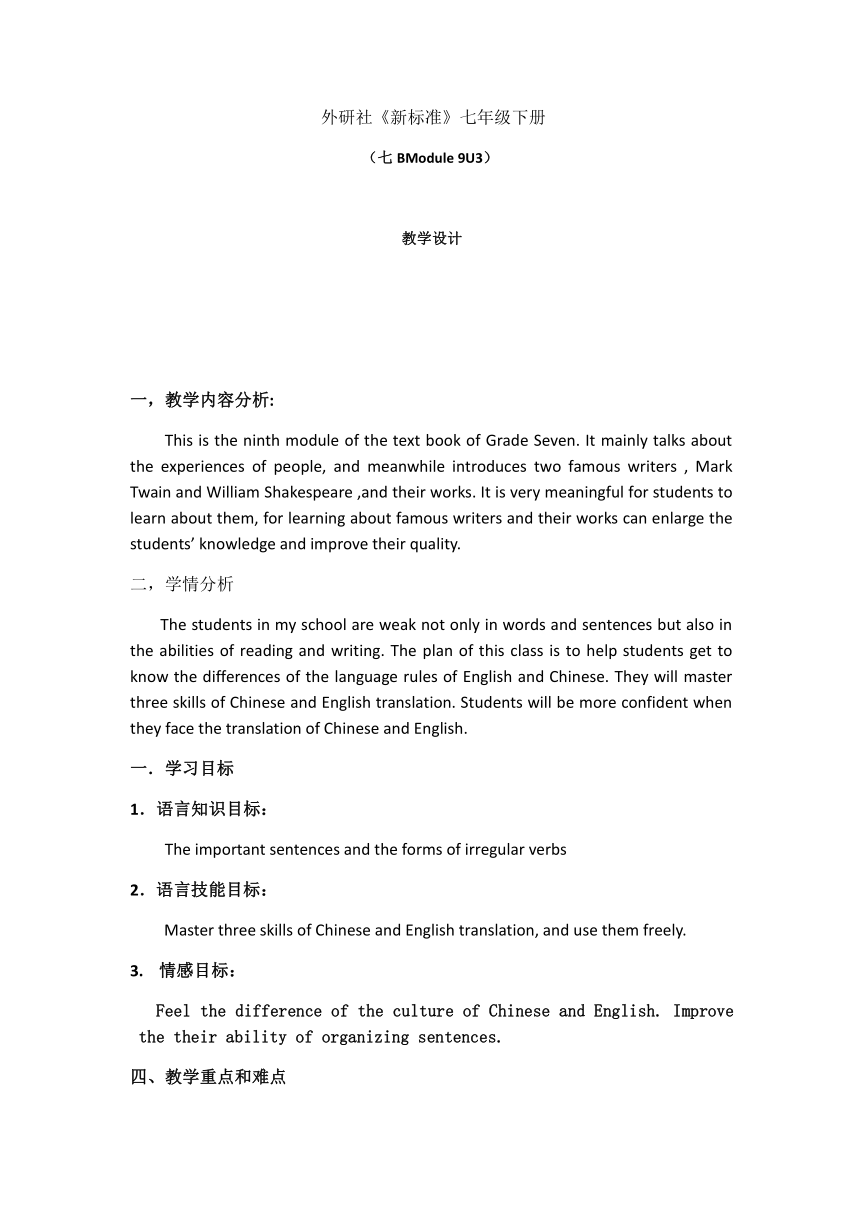
|
|
| 格式 | zip | ||
| 文件大小 | 1.2MB | ||
| 资源类型 | 教案 | ||
| 版本资源 | 外研版 | ||
| 科目 | 英语 | ||
| 更新时间 | 2020-04-23 00:00:00 | ||
图片预览

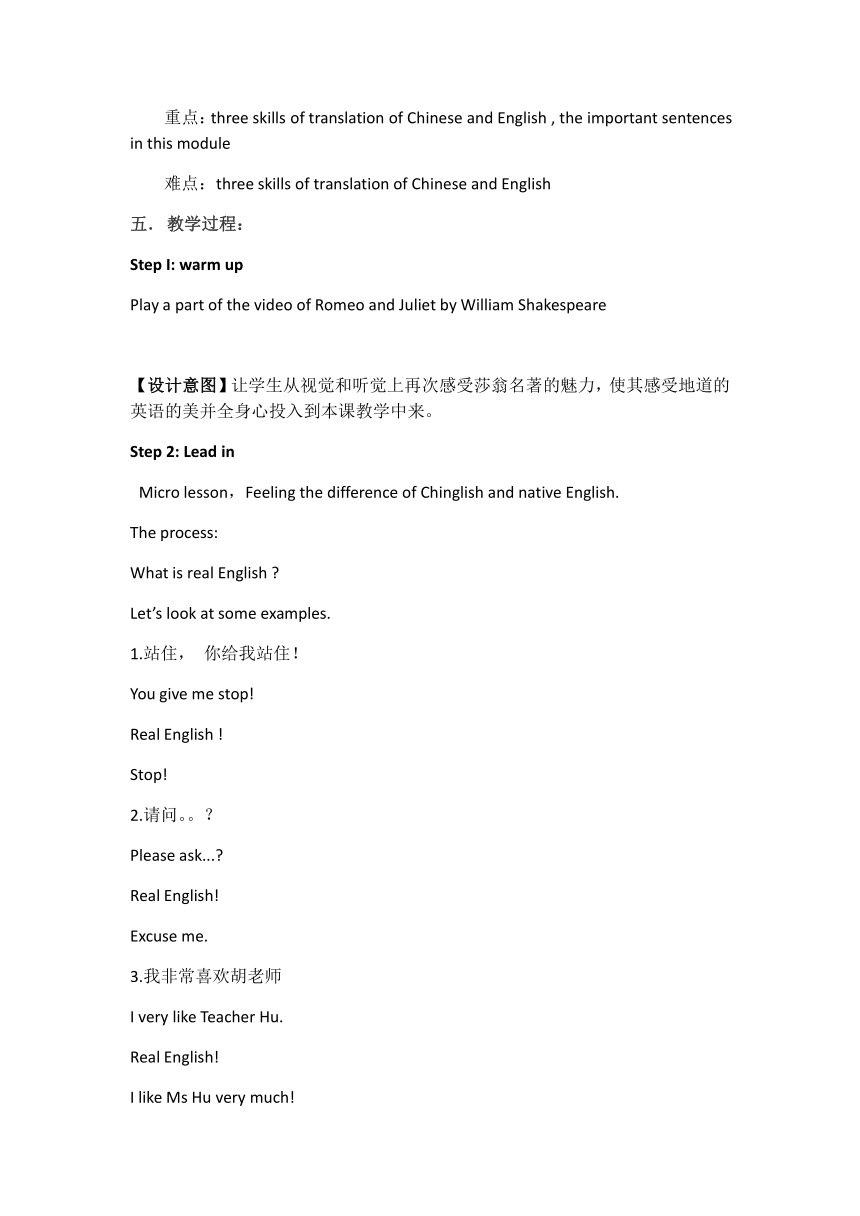
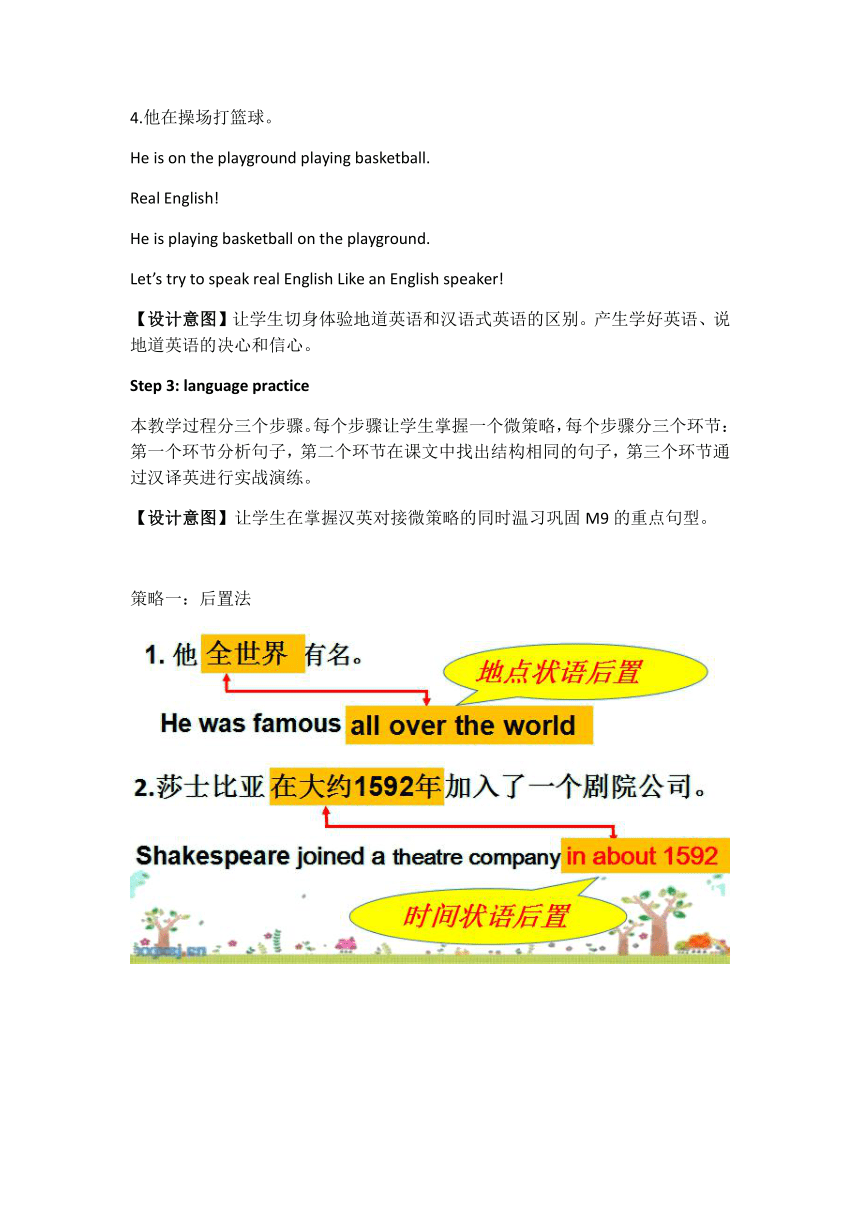
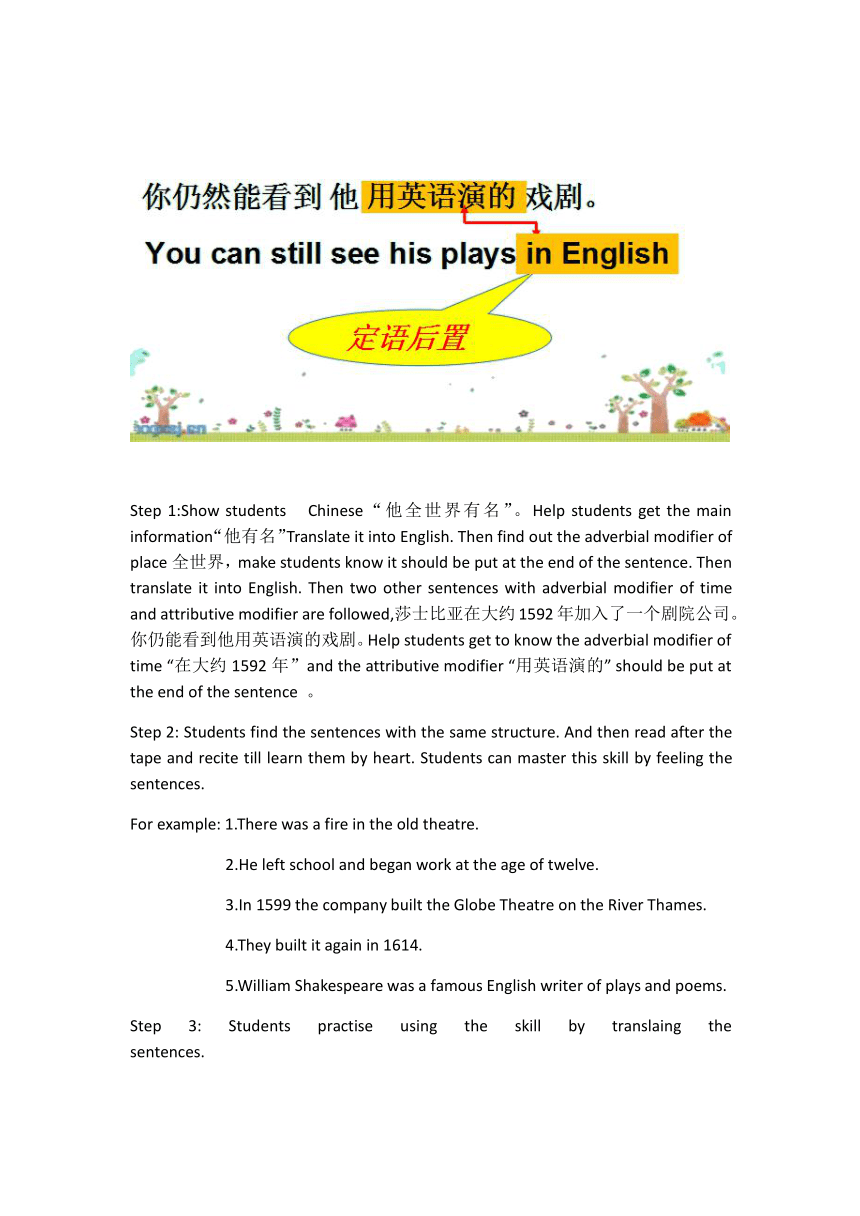
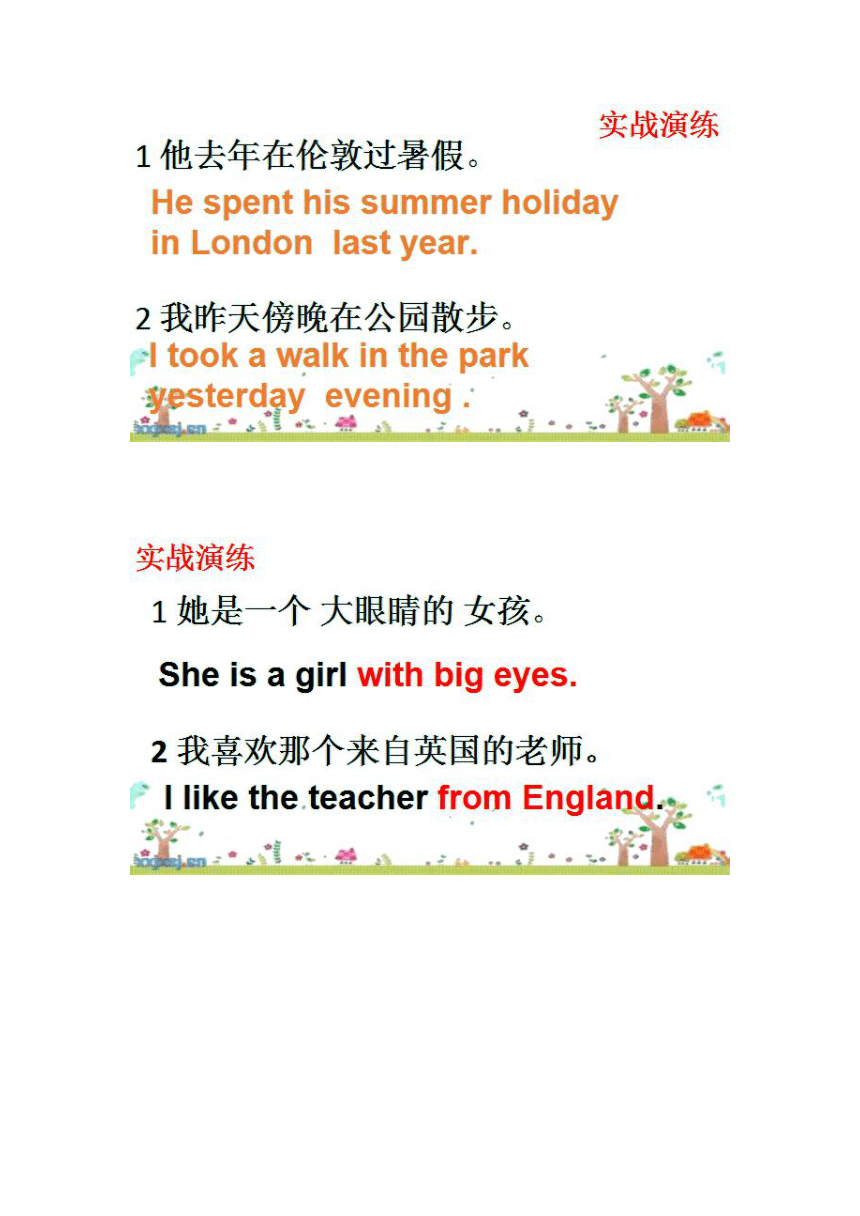
文档简介
外研社《新标准》七年级下册
(七BModule 9U3)
教学设计
一,教学内容分析:
This is the ninth module of the text book of Grade Seven. It mainly talks about the experiences of people, and meanwhile introduces two famous writers , Mark Twain and William Shakespeare ,and their works. It is very meaningful for students to learn about them, for learning about famous writers and their works can enlarge the students’ knowledge and improve their quality.
二,学情分析
The students in my school are weak not only in words and sentences but also in the abilities of reading and writing. The plan of this class is to help students get to know the differences of the language rules of English and Chinese. They will master three skills of Chinese and English translation. Students will be more confident when they face the translation of Chinese and English.
1.学习目标
1.语言知识目标:
The important sentences and the forms of irregular verbs
2.语言技能目标:
Master three skills of Chinese and English translation, and use them freely.
3.????情感目标:
Feel the difference of the culture of Chinese and English. Improve the their ability of organizing sentences.
四、教学重点和难点
重点:three skills of translation of Chinese and English , the important sentences in this module
难点:three skills of translation of Chinese and English
5. 教学过程:
Step I: warm up
Play a part of the video of Romeo and Juliet by William Shakespeare
【设计意图】让学生从视觉和听觉上再次感受莎翁名著的魅力,使其感受地道的英语的美并全身心投入到本课教学中来。
Step 2: Lead in
Micro lesson,Feeling the difference of Chinglish and native English.
The process:
What is real English ?
Let’s look at some examples.
1.站住, 你给我站住!
You give me stop!
Real English !
Stop!
2.请问。。?
Please ask...?
Real English!
Excuse me.
3.我非常喜欢胡老师
I very like Teacher Hu.
Real English!
I like Ms Hu very much!
4.他在操场打篮球。
He is on the playground playing basketball.
Real English!
He is playing basketball on the playground.
Let’s try to speak real English Like an English speaker!
【设计意图】让学生切身体验地道英语和汉语式英语的区别。产生学好英语、说地道英语的决心和信心。
Step 3: language practice
本教学过程分三个步骤。每个步骤让学生掌握一个微策略,每个步骤分三个环节:第一个环节分析句子,第二个环节在课文中找出结构相同的句子,第三个环节通过汉译英进行实战演练。
【设计意图】让学生在掌握汉英对接微策略的同时温习巩固M9的重点句型。
策略一:后置法
Step 1:Show students Chinese“他全世界有名”。Help students get the main information“他有名”Translate it into English. Then find out the adverbial modifier of place全世界,make students know it should be put at the end of the sentence. Then translate it into English. Then two other sentences with adverbial modifier of time and attributive modifier are followed,莎士比亚在大约1592年加入了一个剧院公司。你仍能看到他用英语演的戏剧。Help students get to know the adverbial modifier of time “在大约1592年”and the attributive modifier “用英语演的” should be put at the end of the sentence 。
Step 2: Students find the sentences with the same structure. And then read after the tape and recite till learn them by heart. Students can master this skill by feeling the sentences.
For example: 1.There was a fire in the old theatre.
2.He left school and began work at the age of twelve.
3.In 1599 the company built the Globe Theatre on the River Thames.
4.They built it again in 1614.
5.William Shakespeare was a famous English writer of plays and poems.
Step 3: Students practise using the skill by translaing the sentences.
Step 4: summarize this skill of 后置法
策略二:转换法
Step 1:SHow a Chinese“旧剧院着火了。”Analyse the property of the word”着火”and get the conclusion that it is a verb。They can use the noun “火” to translate this sentence but the pattern “there be” must be used because it is the only sentence pattern students have learnt so far.
Step 2: Practise by translating the following sentences
Step 3:Summarize the skill of 转换法
策略三:省译法
Step 1: 抛出“他为报纸写文章”。帮助学生分析得出文章这一名词可以不翻译。这就是省译法。“你仍然可以看到他用英语演的戏剧。”演这个动词可以不译。
Step 2: 在M9中找出有省译法的句子,并点读熟记,同时感知省译法。
For example: 1. I am writing about him for my English class.
2. We can find out about him on the Internet.
3. When did he begin his stories ?
Step 3: 汉译英,在实战演练中体验省译法,并能熟练运用。
Step 4: summarize the skill of 省译法
综合演练:
Step 4: summarize the skills of translation of Chinese and English
Step 5 Homework
课后检测翻译下面五个句子:
1. 他十二岁的时候开始工作。
_____________________________________________________________
2. 我打算去农村散步。
____________________________________________________________
3. 网上购物正在改变我们的生活方式。
_____________________________________________________________
4. 我通常在家过暑假。
______________________________________________________________
5. 在五一假期间我将好好玩玩儿。
_______________________________________________________________
Step 6: dismiss students with a word encouraging
同课章节目录
- Module 1 Lost and found
- Unit 1 Whose bag is this?
- Unit 2 Are they yours?
- Unit 3 Language in use
- Module 2 What can you do ?
- Unit 1 I can play the piano
- Unit 2 I can run really fast
- Unit 3 Language in use
- Module 3 Making plans
- Unit 1 What are you going to do at the weekends?
- Unit 2 We're going to cheer the players.
- Unit 3 Language in use
- Module 4 Life in the future
- Unit 1 Everyone will study at home
- Unit 2 Every family will have a small plane.
- Unit 3 Language in use
- Module 5 Shopping
- Unit 1 What can I do for you?
- Unit 2 You can buy everything on the Internet
- Unit 3 Language in use
- Module 6 Around town
- Unit 1 Could you tell me how to get to the Nationa
- Unit 2 The London Eye is on your right.
- Unit 3 Language in use
- Revision module A
- Module 7 My past life
- Unit 1 I was born in a small village.
- Unit 2 I was born in Quincy.
- Unit 3 Language in use
- Module 8 Story time
- Unit 1 Once upon a time….
- Unit 2 Goldilocks hurried out of the house.
- Unit 3 Language in use
- Module 9 Life history
- Unit 1 He left school and began work at the age of
- Unit 2 He decided to be an actor.
- Unit 3 Language in use
- Module 10 A holiday journey
- Unit 1 What did you do?
- Unit 2 This morning we took a walk.
- Unit 3 Language in use
- Module 11 Body language
- Unit 1 They touch noses!
- Unit 2 Here are some ways to welcome them.
- Unit 3 Language in use
- Module 12 Western music
- Unit 1 It's so beautiful!
- Unit 2 Vienna is the centre of European classical
- Unit 3 Language in use
- Revision module B
